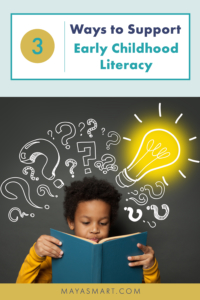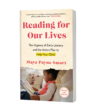Teach a person to read and you open a door—not only to an unparalleled world of wonder and entertainment—but also to independence, freedom, and success.
Yet those doors are remaining closed for too many: In 2019, the National Assessment of Educational Progress showed that two-thirds of the nearly 294,000 fourth- and eighth-grade students who took the test couldn’t locate information that’s stated in a text, infer the main ideas of an article, explain the theme of a story, or evaluate a text from multiple perspectives. Wow.
The assessment has shown decade after decade that a minority of students meet grade-level reading expectations: The majority of U.S. students have limited reading skill. Worse still, the latest scores reveal that our lowest-performing students are worse readers than the lowest performers ten years ago.
This site is dedicated to the proposition that supporting today’s children—tomorrow’s citizens—to develop full literacy is one of the most important things any of us can do for our neighborhoods, community, country, and world. Read on for ways to support this goal, whether or not you have kids of your own.
Support Public Libraries
Public libraries not only provide incredible collections of books and resources freely available to all, they also offer early literacy programs and literacy support for families.
These include story times and other free events, raise-a-reader programs demonstrated to significantly increase the amount families read aloud to kids and the value they place on shared reading, parent education around early literacy, multilingual programming, campaigns to distribute free books that families can keep permanently, and more.
Supporting your public library is a crucial way to advance the cause of literacy for all.
Check out these related articles from MayaSmart.com:
The stunning Austin Central Library has scored high marks for its green power, water-recycling systems, daylight use, views and community connectivity. Yet, we should feel challenged — not satisfied — by this last designation. We’ve built an impressive library, but what must we do to ensure that the people come, including the broadest swath of our community possible?
A particularly moving scene in the film Hidden Figures takes place not at NASA but in the public library of Hampton, Virginia. It got me thinking about the incredible barriers to adult education and career advancement that continue to persist, helped by complex systems of discrimination and segregation.
Support Literacy Nonprofits
Going by the statistics, the deck is already stacked against the three-quarters of children who show limited reading skills in the national assessment.
Research shows that childhood literacy is crucial for achieving further academic success. Students that can read by third grade are less likely to drop out of high school and subsequently less vulnerable to poverty and unemployment. Adult literacy directly correlates with quality of life, as well. What’s more, around 70 percent of U.S. prison inmates operate at the lowest literacy level.
From poverty to equity to criminal justice, just about any social issue you might care about can be positively impacted by supporting literacy. Get started by donating to a national literacy effort, or support an organization in your area with a gift of time, money, or resources.
Check out these related articles from MayaSmart.com:
Austin offers a plethora of options for supporting literacy initiatives. Explore eight local nonprofit organizations in the Austin area that offer opportunities to help open the door to literacy for all. Even supporters outside the area can help with these important initiatives by donating to support their life-saving and life-affirming work.
Sometimes the best thing an emergency room doctor can give a kid is a book. In a world where low-income children hear 30 million fewer words than more affluent peers, literacy’s a true life-saver. Just ask ER doctor Robin Foster, who says she makes as much impact with social engagement as with medical intervention. Foster helped found in-hospital programs dedicated to child advocacy, youth violence prevention, and literacy.
Share Early Literacy Resources with Parents
As demonstrated above, we can’t assume that children will get the reading instruction they need to thrive in school. Most schools simply aren’t equipped to get the job done without outside help.
Instead, parents and caregivers need proven information on fostering literacy at home—ideally from the very earliest days of babyhood. You can help children beat the odds by sharing such science-backed information far and wide. (If you’re ready to take it to the next level, you might even seek out opportunities to give brain-building literacy support to kids in your community or network, by volunteering as a tutor, offering to host a neighborhood story time, or engaging with schools or community groups.)
MayaSmart.com offers a variety of articles and tips about evidence-based ways to develop key literacy skills from birth onwards. Begin with the following posts, then direct any parents, caregivers, or early-childhood educators you know to our many literacy activities for fun and easy hands-on ways to build key skills.
Discover science-backed insights into boosting brain capacity, stimulating language development, and spurring vocabulary growth by sharing reading from day one.
Get a rundown of the top reasons for caregivers to add nursery rhymes—classic, remixed, or brand new—to their daily routines with kids.
The reassuring authors of raise-a-reader books often prescribe a chill pill and a nightly dose of bedtime stories to parents anxious about their kids’ reading. In reality, there’s so much more than reading aloud that we should do to support children’s literacy.
A robust body of research dating back to the 1980s positively associates interactive parent-child reading with language-development gains. Learn seven research-backed ways to capture a child’s attention during story time and give them all the vocabulary and brain boosts possible.
How are you supporting literacy for all? Let us know in the comments, or use the buttons below to connect with Maya Smart on social media!



